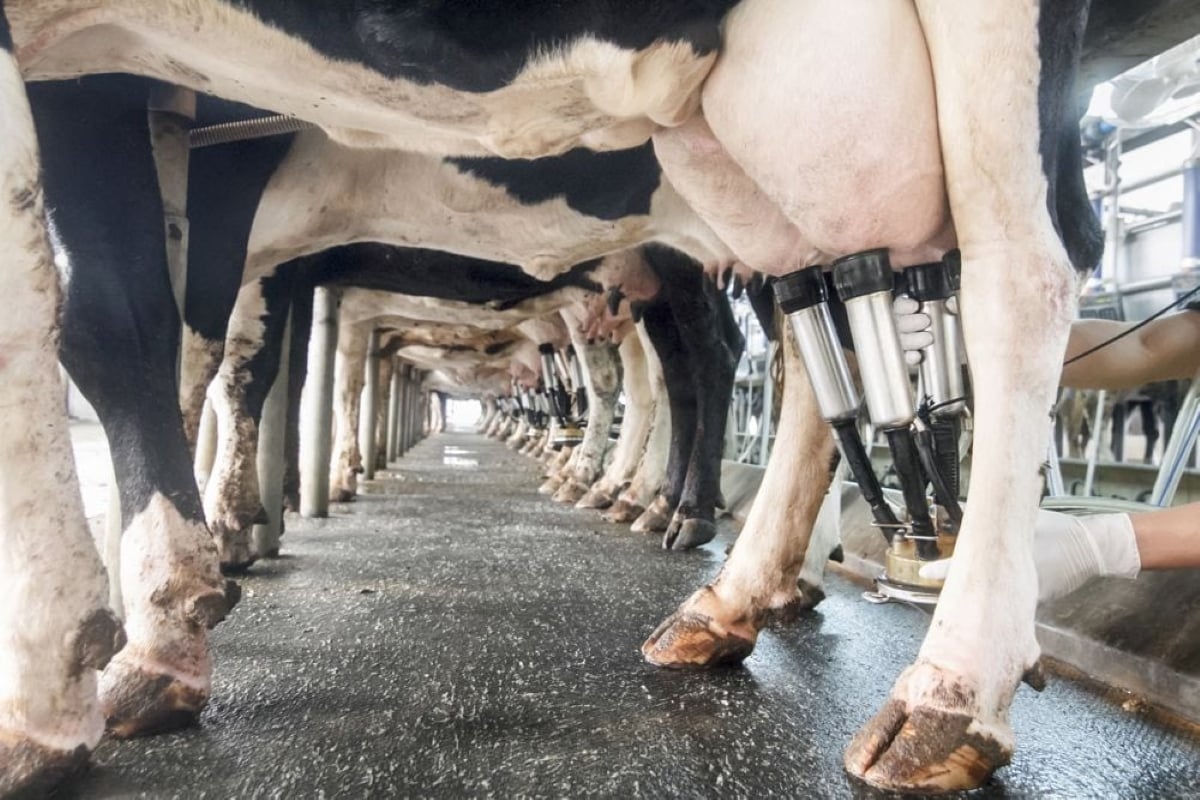Canada’s largest dairy has installed video cameras after an undercover video revealed cows beaten and abused by milking parlour workers.
Eight employees of Chilliwack Cattle Sales were fired days after Mercy for Animals Canada released video footage taken at the farm during the month of May.
Now the dairy operation has installed cameras in each of its barns. Jeremy Whittingstall, a spokesperson for farm co-owner Jeff Kooyman, said the video may be streamed to the internet but he did not have further details as of June 13.
Read Also

Farm gate milk price to rise in 2026
The Canadian Dairy Commission will raise its farm gate milk price by 2.3255 per cent in February, the Crown corporation announced on Friday.
Chilliwack Cattle Sales is Canada’s largest dairy, with 3,500 cows and about 30 employees, in addition to seven Kooymans and various family members.
Video evidence of dairy cow abuse, which included beatings with chains and rakes, punching udders and mechanically hoisting animals by the neck, sent shockwaves through the dairy industry. Dairy Farmers of Canada president Wally Smith said he was “upset, disgusted and devastated” by the news, adding that treatment shown in the video was an anomaly in the industry.
Speaking on behalf of Kooyman, Whittingstall said he and the rest of the family are devastated.
“I really want to stress just how much the family is completely apologetic for what happened,” said Whittingstall.
“This is not indicative of the industry. This is a very bad thing that happened on our farm but it’s not something that speaks to the industry as a whole. We’re going to do everything we can to make it right.”
After release of the video, Mercy for Animals Canada organized a petition asking people to boycott Saputo, which receives milk produced at Chilliwack Cattle Sales. The petition also demanded that Saputo “adopt meaningful animal welfare policies for its dairy suppliers.”
The petition had collected more than 98,000 signatures by June 16.
Saputo announced today that it has stopped taking milk from Chilliwack Cattle Sales and is calling for consequences for those involved in the abuse. It also called for legal measures to prevent future animal abuses.
The B.C. Milk Marketing Board announced plans June 13 to stop collecting milk at the dairy farm until welfare concerns were addressed, but milk was being accepted at the start of this week.
The board said in a news release that it continued to monitor the SPCA investigation and had consulted veterinarians about compliance with the code of practice for care and handling of dairy cattle.
Marcie Moriarty, chief prevention and enforcement officer for the B.C. SPCA, said an investigation remains open.
“Our first priority was to ensure that the direct intentional abuse was halted so that was the focus with respect to the eight on-farm individuals who had been identified,” she said June 12.
“The second priority is of course to deal with any urgent immediate animal welfare issues on farm. I can say orders were issued with respect to issues on site. The third is with respect to any charges.”
Though the SCPA has recommended charges against the employee, Moriarty said she didn’t know if any would be laid against the dairy farm owners.
Whittingstall said some of the eight fired employees are minors, which is complicating the laying of charges. He said the workers comprised one night shift at the dairy barn.
“We’ve interviewed every single employee on staff and it very much was just one shift that took it into their own hands to act beyond what they were trained….
“It’s a group of young men. Young men sometimes can do some silly things and they certainly went beyond anything that they were ever allowed to do.”
Krista Osborne, director of operations for Mercy for Animals Canada, said the person who took the video informed Kooyman that abuse was occurring.
“He was aware. Our investigator spoke to him and informed him of this behaviour. He did know what was going on and he had the responsibility once again to know what goes on in his farm.
“I can tell you with certainty that he was told by our investigator.”
However, Whittingstall said Kooyman was not aware of the abusive behaviour. He said Kooyman starts work at 3 a.m. daily by touring the barns and checking activities in the rotary milking parlour before continuing his usual tasks in the calving barn.
“At no time when he was on site did he see any abuse or anything that signaled to him that something was going on out of order. It’s a huge operation, so they rely on their supervisors to manage these employees,” said Whittingstall.
The supervisor of the shift in question was one of the people fired.
Osborne said the person who shot the video was not given any training during the month he worked at the farm.
Whittingstall said training consisted of showing by example and walking employees through the various steps and tasks required. However, he said Chilliwack Cattle Sales would now develop a framework for training and will train over a longer period in the future. As well, all employees will be given training in animal welfare.
Moriarty, of the SPCA, said she was surprised such training was not already in place.
Installation of video cameras in the barns doesn’t necessarily impress Mercy for Animals, said Osborne.
“They certainly have not said where the video footage is to be aired. One can install a video camera anywhere. What I’m interested in knowing is where they plan to air the footage and who will have access to the footage. Those questions are far more important than simply indicting that they will install cameras.”
She said video from the barns should be live-streamed to the internet so anyone can see it.
“If agriculture has nothing to hide, then they should be in fact proactively seeking to do this, to share with the general public, to share with the consumers exactly what goes on behind closed doors.”
Both Osborne and Moriarty say the livestock codes of practice should be attached to legislation in every province. The B.C. Dairy Association has supported the idea in principle for that province.














